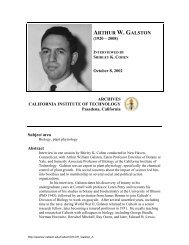Interview with Thomas A. Tombrello - Caltech Oral Histories
Interview with Thomas A. Tombrello - Caltech Oral Histories
Interview with Thomas A. Tombrello - Caltech Oral Histories
You also want an ePaper? Increase the reach of your titles
YUMPU automatically turns print PDFs into web optimized ePapers that Google loves.
<strong>Tombrello</strong>–64<br />
my daughter Susan, who went to Wesleyan, in Connecticut. She was an English major there. I<br />
think she got more attention from the faculty than the other kids did. More even than Kerstin,<br />
who was at Harvard—though I think Harvard was a pretty good place. A lot of people ask me<br />
where their kids should go to school, and I say, “You know, it depends on how well they know<br />
what they want to do. If they really want to be a Marine in science or technology, and if they fit<br />
the social environment, <strong>Caltech</strong>’s a wonderful place. But, you know, places like Harvard and<br />
Princeton and Berkeley and Stanford are great schools. They have lots of social environments.<br />
They have lots of stuff. Kerstin ended up a women’s studies major, and an honors major, at<br />
Harvard. But you wouldn’t have that at most places. I think if they’re not sure what they want<br />
to do, they should try to pick a place that’s just got lots of choices. I’m not against state<br />
universities. I think Berkeley, even <strong>with</strong> all that’s happened to it in the last couple of years, is<br />
still a great place.<br />
ASPATURIAN: Many state universities are.<br />
TOMBRELLO: Yes. Michigan, for example. I think the University of Texas could easily be in<br />
that category eventually. In some areas, it always has been.<br />
ASPATURIAN: You know, every kid, every undergraduate, who comes to <strong>Caltech</strong> is brilliant. At<br />
least on paper and probably in cognitive ability, too. Invariably though, 50 percent of them are<br />
going to end up at the bottom half of the class. I think for these young people it must always be<br />
something of a shock to discover that they are not forever going to be number one. How have<br />
you, as a professor and a mentor, dealt <strong>with</strong> this over the years?<br />
TOMBRELLO: I’ve tried to tell them the following: First, life is not in one dimension. Grades are<br />
just one dimension. When you go to the annual ceremony where they present the Distinguished<br />
Alumni Awards, you notice almost <strong>with</strong>out exception that at most, maybe one of the five or six<br />
being honored were at the top of the class. So many of them say, “You know, I was barely an<br />
average student here.” A few years ago, when I was running the staffing committee for Ed<br />
Stone, we looked at somebody in condensed matter physics named Douglas Osheroff, who’d<br />
been an undergrad here. He’d written a marvelous PhD thesis at Cornell and he was at Bell<br />
Labs. He’s at Stanford now, but he came for a visit when we were trying to recruit him. Ed<br />
http://resolver.caltech.edu/<strong>Caltech</strong>OH:OH_<strong>Tombrello</strong>_T

















